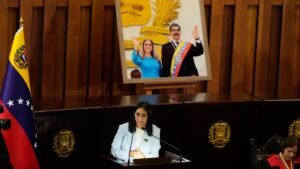Coordination, convergence and alter from the grass roots up — International Points

These are the questions that UN businesses on the bottom in Madagascar are contemplating because the island nation struggles towards local weather change, big humanitarian wants and protracted underdevelopment.
UNICEF’s Deputy Consultant, Head of Programmes Gilles Chevalier and Natasha van Rijn the Resident Consultant for the UN Improvement Programme talk about how adjustments in the way in which they’re working are serving to to bolster resilience and sustainable improvement.
Gilles Chevalier: One of many main choices we’ve got made at UNICEF is to bolster our employees footprint within the south of Madagascar which has been affected by drought on account of local weather change and the El Nino impact. The individuals on this a part of the nation are very weak; many undergo from malnutrition and an absence of entry to fundamental providers, so there are various humanitarian wants.
There are a variety of UN humanitarian businesses that are converging to contribute to the reduction effort within the Grand Sud area. Systematically, these actors are additionally taking a look at methods to stop and mitigate the devastating impacts of local weather change within the south.
Natasha van Rijn: The event indicators within the south, for instance, for well being, training, diet, infrastructure, vitality provide, are all weaker than they’re in different components of the island, and that’s as central to the planning and the conversations that must happen as it’s to the humanitarian response that’s presently ongoing.
The UN is engaged in each humanitarian and improvement work. One option to outline the distinction is to contemplate humanitarian work as addressing the signs of an sickness in an emergency state of affairs whereas improvement works in direction of well being and well-being by addressing the underlying structural points which can finally result in a humanitarian disaster.
Gilles Chevalier: As finest we are able to, we’re attempting to keep away from engaged on small-scale interventions in many alternative places. As a substitute, we’re taking a look at what complementarities are attainable between the interventions of the United Nations system and its companions. Now we have chosen what we’re calling “convergence zones” primarily based on the multidimensional vulnerability that may be recognized within the varied districts. On this means the UN system can actually construct a coordinated long-term intervention.
Natasha van Rijn: Investing extra closely in a single geographical space, has created the surroundings by which others can capitalize on the investments being made.

UN Information/Daniel Dickinson
A pregnant girl is monitored at a UN-supported cellular clinic within the south of Madagascar
In these convergence zones, and customarily as a rule, it is actually essential to underscore that improvement and humanitarian actors work in partnership. We deliver totally different talent units to the desk relying on the problem; whether or not it’s long-term expertise with nationwide companions or how one can reply quickly in an rising disaster.
In fact, it’s essential to additionally acknowledge the position of nationwide counterparts, the federal government, personal sector, civil society or communities as they’re on the core of humanitarian and improvement work.
Gilles Chevalier: We have already seen a really clear shift within the companions’ strategy to programmes in convergence zones. A lot of them usually are not solely wanting on the survival of populations however more and more, additionally they give attention to resilience constructing. We’re happy to see that monetary companions are injecting more and more massive quantities of cash with a longer-term outlook, recognizing the significance of making a sustainable affect. This could solely occur if methods are strengthened regionally and options are contextually tailored.

UN Information/Daniel Dickinson
In Madagascar, UN businesses are prioritizing their help in ‘convergence zones.’
Natasha van Rijn: We name this the humanitarian and improvement nexus. The nexus is about aligning efforts to deal with dangers, stop improvement losses and construct resilience within the midst of disaster. Peace is the third facet of the nexus along with improvement and the success of humanitarian wants. None of those may be achieved with out each other.
There’s a good instance of this with the intervention of the UN’s Peacebuilding Fund in Betroka, Anosy area within the Grand Sud of Madagascar, an space which was insecure on account of cattle rustling. The Fund’s work there contributed in direction of stabilizing the native state of affairs and enabled humanitarian businesses to supply assist extra safely and for improvement actors to start out discussions with the native authorities a couple of vary of points together with native governance, policing and boosting financial exercise.
Gilles Chevalier: It’s important for Madagascar to stay on the focal point not just for our governmental companions, but additionally for donors. Globally, Madagascar was not a precedence for a very long time, however now it’s acknowledged as one of many nations most affected by local weather change worldwide. On this sense, Madagascar has put itself firmly on the map in recent times.
Natasha van Rijn: If we enable ourselves to have a look at the state of affairs in Madagascar with all of the complexity it deserves, then we’ve got an opportunity of addressing the wants in all their advanced multi-sectoral dimensions. Sadly, typical funding mechanisms do not essentially at all times lend themselves to that as they’re focused at both humanitarian or improvement or peacebuilding interventions.
Because of this the coordinating position of the UN, and particularly the Resident Coordinator’s Workplace, is as essential as making use of nexus approaches within the discipline because it brings all companions collectively to debate the best option to contribute to the long-term stability and prosperity of Madagascar.






